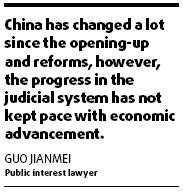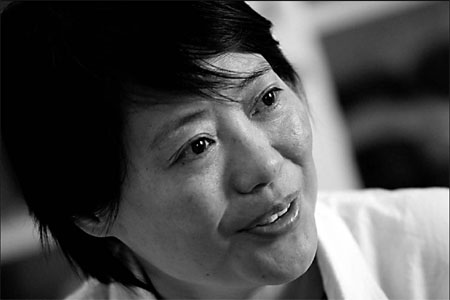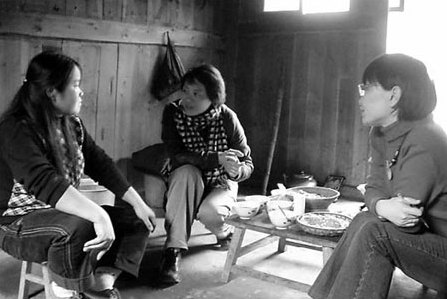In the public interest
|
Guo Jianmei is one of China's leading public interest lawyers. Jiang Dong |
Mention the official who stuck a bundle of banknotes in the face of a 21-year-old waitress in Hubei province for sexual favors, and Guo Jianmei's face turns dark.
One of China's leading public interest lawyers has just recovered from a fracture, but she has been keenly following the case of Deng Yujiao who fatally stabbed the local official in a bathhouse last month.
"Discrimination against women is still widely prevalent in every aspect of Chinese society, especially among the lower social classes," says Guo. "They are the most vulnerable in the male dominated society."
For the past 14 years, 49-year-old Guo and her colleagues from the Center for Women's Law Studies and Legal Services of Peking University, one of the earliest NGOs in China, have been helping women battle injustice and oppression.
"Our laws may appear to be equal to everyone, but in our mainstream culture that lacks an awareness of women's rights, people like Deng often find themselves helpless," says Guo from her office in northern Beijing.
Guo and her colleagues are the first batch of public interest lawyers in China.
Recently, Guo's experience was adapted into aTV commercial on painkillers for a medical company. She played herself in the commercial. Some people saidthe scene of bleeding fingers of a migrant worker, featured in the commercial, was "too offensive for viewers".

Reacting to these criticisms, Guo says: "Real life is much crueler than what is shown on screen. I have dealt with cases where workers have lost their leg and arm at work but still have not been able to get compensation."
The medical company paid Guo 1 million yuan ($146,413), which she has used to rent another room by her office and plans to hire more fulltime lawyers at the center.
Guo was born in a village in Central China's Henan province. Her paternal grandmother died of hunger while on her way to sell steam buns, not long before Guo's birth.
"I didn't understand why grandma starved to death, but dared not eat steam buns," recalls Guo. It was only much later that she understood that her grandmother had deferred to the men in the family and had forsaken her share.
When she was 2, Guo moved to Beijing with her maternal grandparents. Her grandmother worked as a nanny by day and as a garbage collector at night. Guo was often laughed at for her countryside accent and bullied by other urban children.
"At an early age, I began to sympathize strongly with disadvantaged social groups and could relate to their helplessness, struggling to eke out a basic living, and desperate when their limited human rights were violated," says Guo.
Guo returned to her village when she was 8, but had made up her mind to change her life. In 1979, the diligent girl scored the highest marks in her hometown at the national college entrance exam, and was accepted to the Peking University law school.
At university, Guo, who originally chose to learn Chinese literature, realized the power the law had in helping disadvantaged people.
She also fell in love with Liu Zhenyun, a student from the Chinese language department, who shared a similar family background. Her husband is now a well-known novelist.
After graduation, Guo went on to work in the Ministry of Justice. She was appointed legal advisor to the China Women's Federation and was one of the main drafters of the first law of China on the protection of women's rights and interests in 1992.
|
Guo Jianmei (middle) and her team have helped 10,000 people. Courtesy of Guo Jianmei |
In 1995, Guo joined the UN Fourth World Conference on Women held in Beijing. At the forum, she heard non-governmental organization (NGO) activists for the first time, and was greatly inspired by Hillary Clinton's speech, "Women's Rights Are Human Rights".
"There was no NGO on protecting women's rights in China then. I was determined to make the difference," says Guo. Three months later, she founded China's first NGO on providing legal services to women.
The center received $30,000 from the Ford Foundation and Guo and her partners rented a hotel basement as their office.
Lacking money to buy media advertisements, they pasted notices about their center on streets, walls and electricity poles.
Although she suffered many setbacks, she never gave up.
"China has changed a lot since the opening-up and reforms, however, the progress in the judicial system has not kept pace with economic advancement," says Guo.
"Corruption and neglect are pervasive in China's judicial system.
"Some laws in China are even jokingly referred to as 'sleeping beauties'. Although they read perfect and accurate and are comprehensive, they have little effect in practice," says Guo. "For instance, the law on the protection of women's rights and interests sounds more persuasive than punitive. It lacks concrete punishment commensurate with the crime."
Regional protectionism also interferes with justice in China. In a case in which a teacher raped a mentally disabled student in Chengde, Hebei province, Guo received threatening calls from a local office to force her to give up her lawsuit.
"Some traditional values in Chinese culture also put women at a disadvantage," says Guo. Recently, she failed in a sexual harassment case in Chongqing, which was the first case to be filed after the legislation on sexual harassment in 2005. The case involved a female schoolteacher accusing the headmaster of sexual harassment for five years.
"So far, only eight sexual harassment cases have been recorded in China. (Compare that) with the US that sees thousands of cases every year," Guo says.
"In Chinese culture, sexual harassment is seldom associated with the violation of dignity and rights, and often becomes judgment of a woman's morality.
"Most victims choose to keep quite. Daring ones like the young teacher in Chongqing are subject to great pressure and rumors."
She compares her 14 years as a public interest lawyer to "dragging a heavy truck uphill against a strong gale".
Since the founding of the center, Guo and her team have assisted more than 10,000 people, taking more than 1,000 cases to court and winning half of them. They have also built a network of legal aid partners, including anti-domestic violence advocates, lawyers, hospitals, sociologists, public officials, courts, schools, media, NGOs, and psychologists in 28 provinces across China.
In 2007, Guo received the Global Women Leadership Award for her outstanding contribution to the protection of women's rights.
She says she believes in an adage from Mother Teresa: "Life is a challenge, meet it; Life is a duty, complete it."
"Many of my classmates in law school run their agencies and have become millionaires, but I have never regretted my choice," she says. "I want only these words on my gravestone: 'one of the first NGO lawyers in China fighting for women's rights'."
(China Daily 06/29/2009 page8)
















